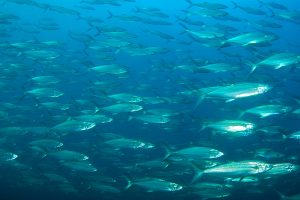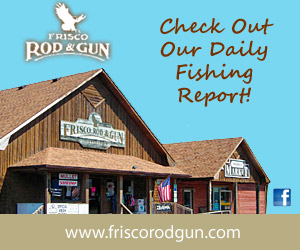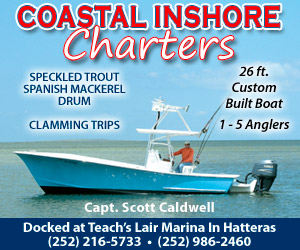
As affected parties may already know, the commercial Spanish mackerel fishery for the Northern Zone, (North Carolina and north), closes this weekend. The closure, along with the new flounder regulations, will deal a harsh blow to many fishermen and fish houses on Hatteras and Ocracoke islands, and we need to propose solutions that could prevent this situation in the future.
The South Atlantic Fishery Management Council and the N.C. Division of Marine Fisheries need to hear our ideas for specific, concrete solutions – a reallocation of the Annual Catch Limit, reevaluation of the total Annual Catch Limit after the next stock assessment, lower trip limit, a step-down limit like that used in the Southern Zone, etc.
The South Atlantic Fishery Management Council – https://safmc.net/ – meets September 16-20 in Charleston, S.C. The Council will be taking public comment at 4 p.m. on September 18.
Online comments can be made from August 30 to September 9 here: https://safmc.net/september-2019-council-meeting-details/
Also, the public can send comments to Steve Poland, the state designee to the SAFMC, at NC DMF via steve.poland@ncdenr.gov, and to Dewey Hemilright, who is the Mid-Atlantic Fishery Management Council liaison, to the SAFMC via fvtarbaby@embarqmail.com.
We also need to correct some inaccurate information contained in the most recent Advisory Panel Fishing Performance Report –https://safmc.net/download/SpanishMackFPR_April2018.pdf. Here are a few examples:
“…fishermen aren’t seeing as many Spanish mackerel as they did a few years ago.”
“In recent years, there have been fewer king mackerel nearshore, and as a result, for-hire fishermen have shifted their effort toward the larger Spanish mackerel that congregate around nearshore reefs in August and September. As a result, there is a lot of pressure on those populations, and they are getting harder and harder to find.”
“For commercial fishermen in North Carolina, one of the biggest challenges is the loss of fish houses. The few that are remaining don’t like to give ice out to fishermen, because they don’t have enough supply to go around, and conflict has become commonplace. This is a big problem in North Carolina where fishermen must travel long distances to get offshore. Fish that haven’t been on ice are lower quality and have a lower market value.”
“Spanish mackerel is not a marketable fish, and as a result, as soon as any amount comes on the market prices will drop. Majority of Spanish mackerel landed in North Carolina is sold to northern markets such as: New York, Boston and Canada. There is no local demand for Spanish mackerel in North Carolina.”
“In general, the AP members felt that the allocation between the recreational and commercial sectors (45% and 55%, respectively) was appropriate. The commercial fishery doesn’t have enough market space to add more fish.”
(Side note: in recent times, the most recreational anglers have landed was 45% of their quota.)
Please send corrections to Steve Poland, John Hadley, SAFMC economist (john.hadley@safmc.net) and Christina Wiegand, SAFMC social scientist, (christina.wiegand@safmc.net ).





